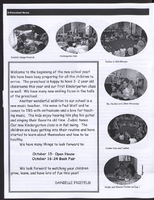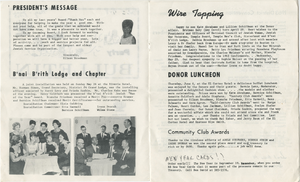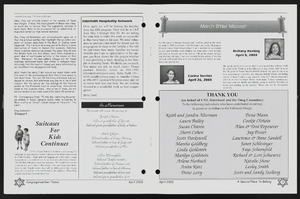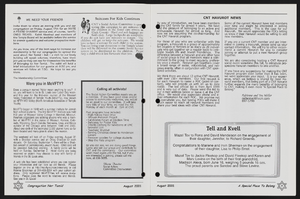Search the Special Collections and Archives Portal
Search Results

Transcript of interview with Roger Thomas by Stefani Evans and Claytee D. White, August 31, 2016
Date
Archival Collection
Description
As he reveals in this oral history, Roger Thomas is, among many other things, a son, a father, a brother, a husband, a student, an artist, a visionary, and a philanthropist. As the second son of Peggy and E. Parry Thomas’s five children, Roger was raised a Mormon child of privilege and civic responsibility. The banking family summered in Newport Beach, wintered in Sun Valley, and taught their children by words and deeds that it is not up for debate if you will be involved in your community; the only question is how you will apply your talents and resources to benefit your community. Roger absorbed the lessons well. As a child who struggled in school but excelled in art, he attended his last two years of high school at Interlochen Arts Academy, graduating in 1969, finally finding himself “in an environment where what I did had currency.” From there he earned his BFA from the School of the Museum of Fine Arts Boston and Studio Degree from Tufts University before returning to Las Vegas and eventually joining Steve Wynn’s team in 1981. As Executive Vice President of Design for Wynn Design & Development, he is the man in whom Steve Wynn places his trust to make real at each Wynn property the Wynn design philosophy: aim for a constituency of highly sophisticated, well-traveled, very educated people and give them a reality, a now, that is so fetching, so alluring they wish to be no place else. As he was mentored by his father and Steve Wynn, he too is mentoring those who will follow him. At Wynn, the next generation will carry forward the Wynn idea of evoca-texture, of creating “moments of experiential emotion that result in a memory so captivating and so unique that if you want to repeat that you have to come back.” At home, he collaborates with his daughter on a children’s book that has the potential to become a series; she is the illustrator, while he provides the words. Roger Thomas sat for this interview five days after his father, E. Parry Thomas, passed away in Idaho. Instead of postponing the interview to a more convenient time, Roger kept the appointment and explained, “This is for UNLV. If I’d cancelled my father would have killed me.”
Text

Transcript of interview with Louis F. La Porta by Stefani Evans and Claytee White, November 4, 2016
Date
Archival Collection
Description
Louis La Porta served on the City Council of Henderson, Nevada and the Board of Clark County, Nevada and oversaw periods of great growth. He was born in 1924 in New York City, but his service in the United States Air Force pulled him out West. After settling in Henderson, Nevada, with his wife Elayne, La Porta became interested in insurance sales and local politics. While in office, La Porta oversaw the development of critical roads for Clark County, the Henderson Historical Society, and Henderson Libraries. He recounts each of these major developments in his interview, chronicling the evolution of Henderson, Nevada, into a major city.
Text

Jaime Cruz interview, July 3, 2019: transcript
Date
Archival Collection
Description
Interviewed by Rodrigo Vazquez. Cruz was born in Lima, Peru to Carmen, who retired from CCSD as a teacher's aide, and Jaime, who was a professional soccer player. When young Jaime emigrated to the United States in 1987, it was to join his mother and brother in Las Vegas. The culture shock was significant, but he was undaunted. And, despite his engineering degree, the only employment he could secure was that of dishwasher. Cruz quickly understood the employment barriers that he would encounter and thankfully with the encouragement of mentors he improved his English skills and never omitted his degree from his resume. Eventually, it was noted and the decision to take a position that utilized this training would be one he never regretted. Today Cruz is the Executive Director of Workforce Connections, Southern Nevada's Local Workforce Development Board.
Text

Transcript of interview with Sally L. Jackson by Krista Jenkins, March 2, 1980
Date
Archival Collection
Description
On March 2, 1980, collector Krista Jenkins interviewed assistant manager, Sally L. Jackson, (born March 28th, 1932 in Culver City, California) in her home in Las Vegas, Nevada. The interview covers the social and environmental changes that have occurred in Las Vegas. Sally also discusses the hospitality industry and offers details on the local hotels, casinos, and nightclubs in Las Vegas, Nevada.
Text

Transcript of interview with Eldon Cooper by Kamal Whilelm, March 3, 1975
Date
Archival Collection
Description
On March 3, 1975, Kamal Wilhelm interviewed Eldon G. Cooper (born 1922 in Overton, Nevada) about his experiences in Southern Nevada. Also present are Cooper’s wife and several unnamed adults in the background. Cooper first talks about his background and his eventual move to Las Vegas before describing the recreational activities in which he and his family took part. He later describes the atomic testing, environmental changes, modes of transportation, social changes, and tourism in Las Vegas. Cooper also discusses the Stewart Ranch, and his wife describes the setting of multiple photographs taken of properties in the Downtown Las Vegas area.
Text

Transcript of interview with Flo Mlynarczyk by Claytee White, July 7, 2005
Date
Archival Collection
Description
Flo Mlynarczyk began life in Fort Morgan, Colorado. Her parents divorced and she moved with her mother first to Loveland and eventually to Los Angeles. Her mother started the first Red Cross in Bell Gardens, oversaw the building of their home, and raised money for various charities. Flo remembers when the Japanese were rounded up and interred during WWII. She was in grade school and recalls that one day they all just disappeared. Upon graduation from high school in 1943, Flo moved to Kodiak, Alaska, to live with friends. She recalls total blackouts on the streets of Kodiak due to the war, the Short Snorter Club, and her return to California after a bout of pneumonia. Back in Bell Gardens, Flo worked for a department store, married and divorced in 1945, gave birth to her son Michael in 1946, and ended up in Tonopah, Nevada, with a sister who ran a cafe there. After a second marriage ended, Flo moved to Las Vegas and began working at Phelps Pump and Equipment as a bookkeeper.
Text




